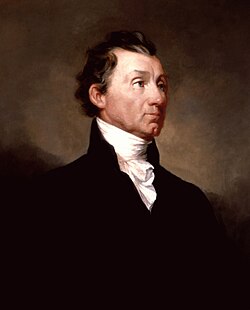📖 Presidential Profile
Comprehensive overview of leadership, policies, and historical significance
📋 Biography & Political Journey
Revolutionary War Service and Early Political Career
James Monroe was born on April 28, 1758, in Westmoreland County, Virginia, into a planter family. At age 18, he left the College of William & Mary to join the Continental Army during the Revolutionary War. Monroe distinguished himself in combat, particularly at the Battle of Trenton in 1776, where he was wounded while crossing the Delaware River with George Washington. This experience forged a lifelong bond between Monroe and Washington, who would later become his political mentor.
After the war, Monroe studied law under Thomas Jefferson and quickly entered Virginia politics. He served in the Virginia Assembly and later as a delegate to the Continental Congress. Monroe was initially opposed to the ratification of the Constitution, believing it gave too much power to the federal government. However, he eventually supported its adoption after the Bill of Rights was added to protect individual liberties.
Monroe’s diplomatic career included service as minister to France, Britain, and Spain. His time in France during the French Revolution gave him valuable experience in international affairs and reinforced his support for republican government. He also served as governor of Virginia twice and played a crucial role in negotiating the Louisiana Purchase as a special envoy to France in 1803.
The Monroe Presidency and Era of Good Feelings
Monroe’s presidency, beginning in 1817, coincided with a period known as the “Era of Good Feelings,” characterized by reduced partisan political division and national optimism. His administration oversaw significant territorial expansion and economic growth. The Missouri Compromise of 1820, though not initiated by Monroe, was signed into law during his presidency and temporarily resolved the growing tension over slavery’s expansion into new territories.
The Monroe Doctrine, announced in 1823, became the defining achievement of his presidency and a cornerstone of American foreign policy for generations. This doctrine declared that the Western Hemisphere was closed to further European colonization and that any European interference in the Americas would be viewed as a threat to American security. While the United States lacked the military power to enforce this doctrine alone, it was backed by British naval supremacy, making it effective in practice.
Controversial Missouri Compromise
The most significant controversy of Monroe’s presidency involved the Missouri Compromise of 1820. The admission of Missouri as a slave state threatened to upset the delicate balance between free and slave states in the Senate. Monroe initially struggled with whether to sign the compromise, as he had constitutional concerns about Congress’s authority to restrict slavery in territories. The debate revealed the deep divisions over slavery that would eventually lead to civil war.
Monroe’s handling of the Seminole Wars in Florida also drew criticism. General Andrew Jackson’s aggressive military campaign against the Seminoles exceeded his orders and involved executing British subjects, nearly causing an international incident. While Monroe publicly censured Jackson, he privately supported the general’s actions, leading to accusations of duplicity and aggressive expansionism.
The Presidential Fashion Trendsetter
James Monroe was the last president to wear knee breeches, silk stockings, and buckled shoes – the formal court dress of the 18th century. His insistence on maintaining this old-fashioned attire earned him both respect and ridicule from contemporaries. During his presidential tour of New England in 1817, crowds would gather not just to see the president, but to witness his elaborate colonial-era costume. Monroe’s wife Elizabeth also maintained formal court etiquette at the White House, requiring guests to bow or curtsy in their presence, leading some democratic-minded Americans to criticize the Monroes for putting on “royal airs.” This commitment to formality reflected Monroe’s belief that the presidency should maintain dignity and respect, even if it sometimes appeared comically outdated to his contemporaries.
Humor & Jokes
Louisiana Purchase Support
Monroe supported the Louisiana Purchase as Jefferson's envoy. Real estate deals that doubled the country's…
Read More →Greatest Wins
⚖️ The Missouri Compromise: Preserving National Unity
Monroe's support for the Missouri Compromise temporarily resolved the slavery crisis, maintaining the delicate balance…
Read More →Epic Fails
⚖️ Missouri Compromise and the Expansion of Slavery
Monroe's handling of Missouri's statehood sparked America's first major crisis over slavery expansion, revealing deep…
Read More →